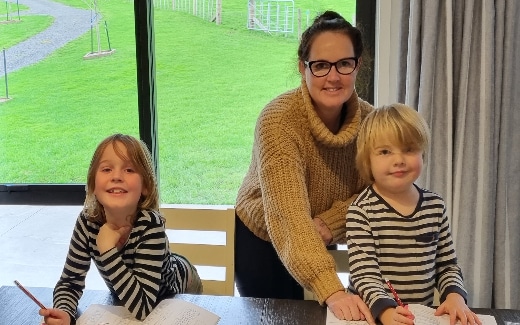The Perfect Fit
Many parents of children struggling in the classroom consider homeschooling. It’s not for everyone, but it was the perfect fit for Holly Blair’s family in Matamata.
When we decided to homeschool our boys, Jude (7) had already been at school two years, and my youngest, Haddin (5), was just starting school. Jude did enjoy school as he’s a sociable boy, but he’s always struggled with reading and writing. His first teacher spotted Jude’s dyslexia at only five years old. We got him assessed through SPELD and he’s been with his SPELD teacher for over a year. It definitely helps.

The school we were at was a small Christian school. It was a nice environment, and their attitude to help Jude was good. I didn’t take him out due to disappointment with the school. But as the kids got older and Jude still needed a lot of extra support, I felt the teachers were pulled in too many directions to give him what he needed consistently. They were willing to try, and we did see improvement in his reading, but at the start of this year his writing was very behind.

I felt there was no harm giving homeschooling a go. If things got worse, he could always go back to school. As it turned out, we all really love it. The boys benefit from having my attention one-on-one and spending quality time together. They enjoy being able to learn at their own pace and we’re free to spend as much time as needed on writing.
We’ve had a lot of support and tips from Jude Kane, our awesome SPELD teacher. Also, my Jude really thrives on not having distractions of other students and other goings-on in the classroom. He’s free to run around outside when he needs to without having to stick to a certain schedule, and without his classmates feeling it’s unfair if he has certain privileges he needs to succeed.
We can streak ahead in areas of interest and gifting ̶ history, science etc. (We have regular dinosaur class.) We also suspect Jude has ADHD and giftedness, which aren’t yet diagnosed due to his age. I’ve never met a kid that loves to learn like Jude. He researches all day long and absorbs and retains everything; his memory is incredible. His absolute favourite thing is museums. He loves history, dinosaurs and science. He’s so much fun to homeschool because he’s so switched on. We go on as many field trips as we like. We’re excited to be heading to the USA for a month of museums and dinosaur-fossil exploring, which will be great hands-on learning.
We can streak ahead in areas of interest and gifting.
My background was accounting, so I don’t have much of a grid for teaching. But they’re my kids, and I know them best, I love them the most, so it just makes sense to me. I intuitively know what they need and how best to teach each of them.
I’ve tried a few different homeschool curriculums, but most didn’t have a robust enough phonics programme for what I wanted. So, I’ve put together my own mix of what works for us. For reading and writing I use Cracking the ABC Code, which I really love. It’s very robust. I also use Phonics Pathways for my younger son Haddin (who doesn’t have dyslexia). For maths I use CTC and for a lot of our social sciences, I am using Schoolhouse Teachers (from the USA). We link up with a homeschool group in Tauranga and get support from Facebook homeschooling and dyslexia groups like this one: https://www.facebook.com/homeschooldyslexia
I was worried about whether I’d cope with homeschooling, but I was surprised to find that I loved it! It’s super fun, and I get to spend quality time with the kids. Overall, homeschooling fits us really well and it’s an awesome lifestyle – very freeing.
By SPELD NZ parent Holly Blair
First steps
- Any parent or legal guardian of a child aged between five and 16 can apply to home educate through their local Ministry of Education office.
- To gain approval, your application must satisfy the Ministry that your child will be taught at least as regularly and as well as they would be in a registered school.
- You must provide a detailed description of how you would educate your child, the resources you intend to use, how you’ll cover a particular topic, and what your homeschooling schedule would look like.
- If your child has special education needs, the application must show that these will be met.
- While you’re not required to use it, you are eligible to receive The New Zealand Curriculum or Te Marautanga o Aotearoa free of charge.
Home educators are eligible for the home education supervision allowance, calculated on the number of children you are home educating.
Find out more about home schooling:
Ministry of Education – Home education
Dyslexia Support NZ for Homeschooling (Facebook page)
Dyslexia Evidence Based – Homeschooling





